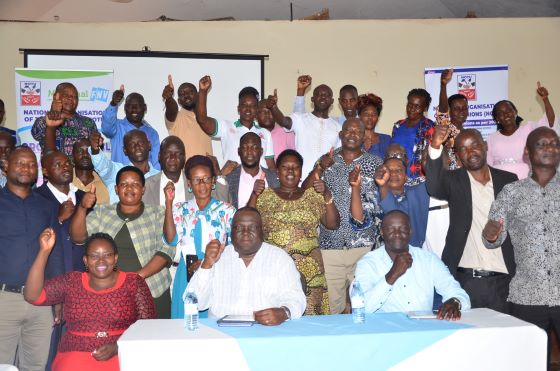MASINDI, March 3, 2025 – Workers from various sectors in the Bunyoro subregion have been urged to affiliate with different trade unions to strengthen their bargaining power when negotiating for better working conditions.
“At present, the situation is not favourable. People are working for four to five years without contracts. Workers are employed on casual terms, which is not ideal. However, when workers join trade unions, they will be able to negotiate for better conditions,” said Richard Bigirwa, the Secretary General of the National Organisation of Trade Unions [NOTU], during a refresher training on social dialogue and negotiation skills. The training was organised by NOTU and took place recently at the Country Inn Hotel in Masindi Town.
The event was attended by labour officers, workers’ league leaders, and workers’ councillors from the districts of the Bunyoro subregion.
Bigirwa noted that NOTU has 38 affiliates and is a recognised entity in Uganda with the mandate to represent workers and sensitise them about their rights such as freedom of association.
“Our role is to serve as a link between the government and workers, as well as to coordinate the different affiliates. However, many people have not fully appreciated the importance of affiliating with NOTU,” he added. “One of the reasons for this training is to guide participants through the process of joining unions.”
He further mentioned that NOTU continues to face challenges from employers who discourage their employees from joining unions and affiliating with NOTU.
“We have a problem of awareness. Many councillors and other workers’ leaders are not adequately informed about their roles. However, the current leadership has adopted a new approach towards various matters. What we need is for workers’ leaders to assert themselves and defend workers’ rights. Leaders must ensure that workers are respected by their employers,” said Bigirwa.
Participants were briefed on key principles and standards within both the international and national legal frameworks, trade unionism, definitions, legal and policy frameworks, and the reasons for trade unionism.
They were also updated on the developments and ongoing interventions by NOTU.
During the training, participants highlighted several challenges they face within local governments, including limited interaction between workers’ Members of Parliament and local leaders.
Other issues included union leaders failing to engage with their constituents, a lack of understanding of leadership roles in relation to workers, limited access to workplaces by labour officers and workers’ councillors, and a general lack of awareness among employees of their rights.
The participants also noted poor coordination between NOTU and the unions, undermining of councillors, insufficient budget allocation for workers’ leaders and labour officers, and the failure to recognise workers’ representatives.
Nicolas Businge, the Programs Officer for NOTU, explained that the organisation is engaging with different regions to gather feedback on how best to address these challenges.
“We are changing how NOTU operates. We want to bring it closer to the people. We are also here to equip you with the skills needed to address various issues affecting workers. Trade unions are strong partners when it comes to workers’ welfare. Workers’ councillors, why do you allow workers to be intimidated when you are around? You need to assert yourselves in protecting workers’ rights,” said Businge.
Denis Tumwine, the Workers’ Councillor for Masindi district, commended NOTU’s leadership for its efforts to reach the grassroots, noting the significant gap between district-level workers’ leaders and NOTU.
“Our appeal to you is to engage with the local government minister to consider increasing funding for workers’ leaders, as what they are receiving at present is inadequate. We also face the challenge of rarely meeting with the workers’ MPs. They do not focus on their constituents and only appear during elections,” he said.
Gerald Ategeka, the Workers’ Councillor for Kibaale District and Vice-Chairperson of the district, called for the orientation of workers’ leaders, stating that many are unaware of their responsibilities.
“If we are to serve effectively, we need to be oriented in our roles. You cannot be assertive if you are not empowered in your duties. My appeal to the government is to address the issue of salary disparity. The situation where scientists are better remunerated than those who studied arts has caused confusion and demoralised many workers,” he said.
Buy your copy of thecooperator magazine from one of our country-wide vending points or an e-copy on emag.thecooperator.news
